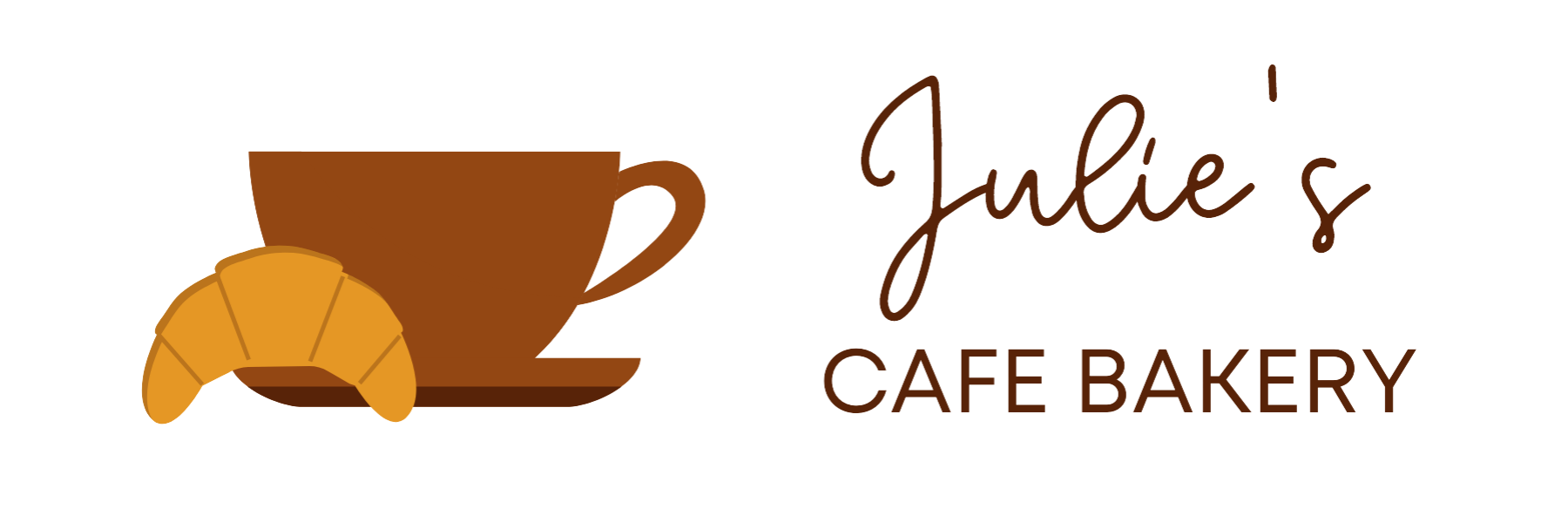Garlic Herb Butter With Dried Herbs
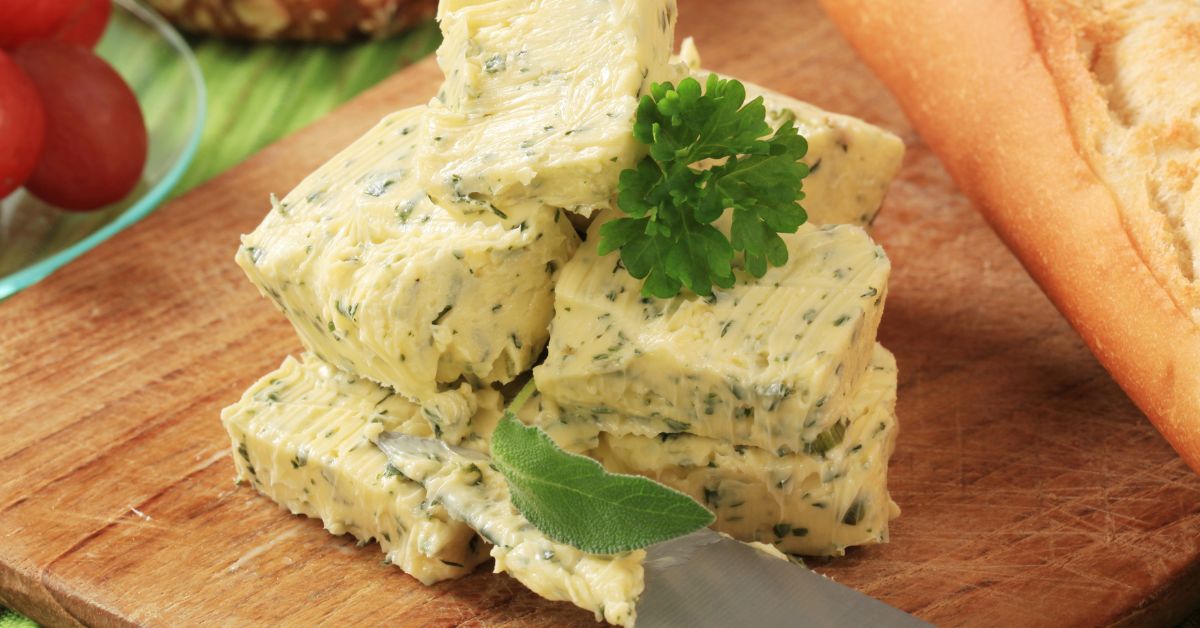

Herb butter is the ingredient that can make any dish luxurious, yet it is so simple. No expensive condiments, no fancy cooking technique – just some butter, herbs, and spices. But what type of herbs do you use to make this modified butter, fresh or dried?
To make herb butter with dried herbs, you must soften your butter, mix it thoroughly with your desired herbs, and refrigerate the mixture to make it hard again. Use either salted or unsalted butter for this. If a recipe calls for fresh herbs, use ⅓ of the specified amount of dried herbs instead.
In this recipe, I will show you some easy and quick recipes for making herb butter of different flavor profiles. We will discuss the uses of various types of herb butter as well as how you can preserve them for later use.
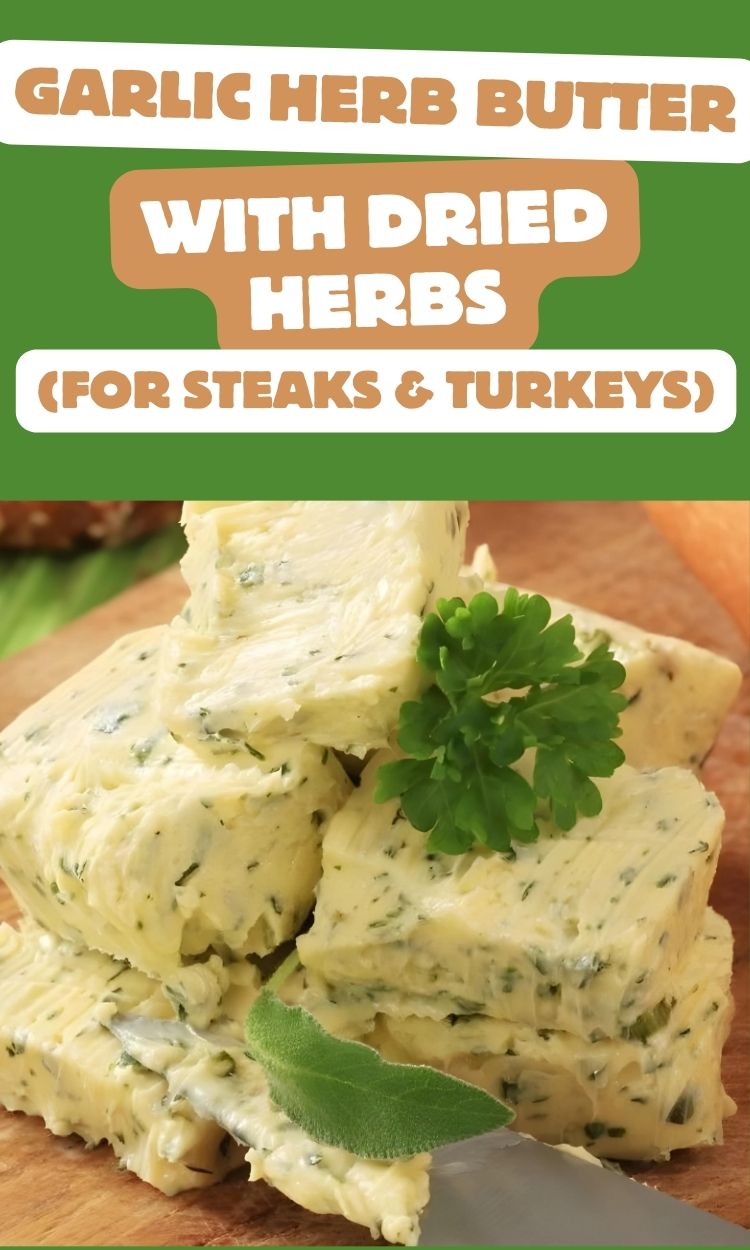
What is herb butter made of?
Herb butter is right about what it sounds like – it is butter mixed with various herbs. Different herbs infuse the butter with the varying flavor profile. As such, different herb kinds of butter are suited to different dishes. Typically, you mix melted or softened butter with your choices of herbs and spices, mold it into a log, then cut slices of the butter and use it in dishes accordingly.
This amalgamation of multiple herbs, spices, and seasoning is why some call this butter “compound butter.” So, compound butter is not a commercially produced or branded item. Rather it is a homemade endeavor to enrich plain old butter.
Fresh herbs vs. dried herbs in butter
When deciding on the sort of herbs you are going to utilize, you choose between dried and fresh ingredients. And there are differences between the two.
You pick fresh herbs straight out of a garden or your local vegetable stand. But if you took these herbs, dried them appropriately, and ground them into powder or chop them, you get the dried versions. It is the difference between a fresh basil leaf and basil powder in a can.
Fresh herbs are simply plants or their leaves. Thus, they have a higher concentration of water. In contrast, part of the process of making dried herbs involves removing all the moisture from them. Therefore, dried herbs have a stronger, more concentrated flavor than their fresh counterparts.
On the other hand, fresh herbs bring more vibrancy and color to the butter. So, certain herbs work much better when they are freshly pulled from the garden. Tarragon, chives, parsley, etc., are much better when they are fresh.
In contrast, herbs such as rosemary, oregano, basil, thyme, etc., are perfectly usable dried and ground. Drying the herbs is also a good way of preserving them for much longer.
Another aspect you must consider when selecting dried or fresh herbs is the cooking time. Fresh herbs are much better if you make a raw dish such as a salad or salsa or a dish. This way, the freshness of the herbs can shine through properly. Dried herbs will give you a dusty, grainy texture when uncooked. So, use them in dishes that take longer to cook.
So, make it with fresh herbs if you plan to use the butter to garnish or drizzle over the dish. But if you want to cook the butter in a sauce or with steak for a considerable amount of time, then use dried herbs instead.
Also, if you are planning to store the butter for a long time, choose the dried herbs because the fresh herbs will gradually lose their freshness over time. So, at that point, it is just better to use their dried version.
How to substitute fresh herbs with dried herbs?
You can find many recipes for compound butter that includes freshly chopped herbs. Not everyone has a garden or nursery nearby to collect these plants. In situations like this, you can comfortably substitute the fresh herbs with their dried versions and still make your desired butter.
When replacing the fresh herbs in a recipe, use this general rule – one tablespoon of fresh herbs equals one teaspoon of dried powder of that same herb. This is because the flavor in dried herbs is much more concentrated as it has little to no water. So, it is easy to overpower the butter if you use too much of it.
So, if a recipe calls for 1 tablespoon of fresh parsley, you can replace it with 1 teaspoon of dried parsley. Since one tablespoon equals 3 teaspoons, you are using 1/3 of the specified amount of herbs as it is dried.
Which dried herbs are the best for compound butter?
You can practically use any dried herbs you want to flavor the butter. Ideally, you should consider what sort of dish you will make with the butter. Then you need to figure out which flavor goes with that particular dish.
For example, basil goes well with pasta, chicken parmesan, scrambled eggs, etc. And butter makes all of these dishes very creamy and rich. So, use compound butter infused with the basil in these dishes.
Another example is tarragon butter. Tarragon is commonly used to roast lamb or beef. So, use tarragon-infused butter to take these dishes to the next level.
Similarly, whether you have rosemary, parsley, oregano, or thyme at your disposal, you should think about the type of dish that will pair well with that specific herb.
How to make herb butter at home
Step 1
The basis of any good compound butter is quality butter. It can be salted or unsalted. But the butter should be high in fat with a smooth texture.
Leave this butter at room temperature until it becomes soft. Alternatively, you can microwave the butter in a microwave-safe bowl for 10-20 seconds at 10% or until the butter reaches the right consistency. Remember, you are not looking for melted butter. You just want the butter to be lenient enough so that it is easy to stir.
Step 2
Gather the herbs while the main ingredient is softening. If you are using fresh herbs, chop them up very finely. If you are using dried herbs, use about 1/3 of what you would have done with the fresh herbs.
As a rule of thumb, use 1 tablespoon of fresh herbs or 1 teaspoon of dried herbs for ½ a cup of butter. You can change the ratio depending on how strong you want the flavor of the herbs to be.
Additionally, you can use lemon zest or lemon juice, garlic powder or minced garlic, and other spices per your liking.
Step 3
Place the butter along with all of the other ingredients in a bowl. Mix them thoroughly with a fork until you get a uniform spread. Add salt and pepper to taste. This is especially important if you start with unsalted butter.
Step 4
You can simply cut slices from this log whenever you want to use it in a dish. For storage, you can place the butter log directly in the fridge covered in parchment or wax paper.
You can mix and match different herbs and spices to get the desired effect you are looking for. Here are a few examples you take ideas from. You can add to the flavor and give the butter your twist.
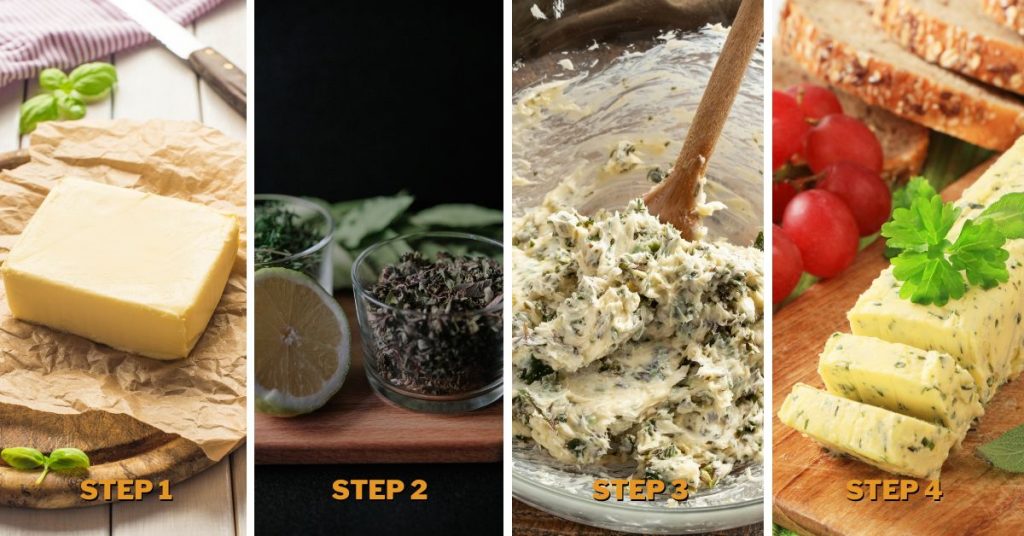
Parsley and chive butter
- ½ cup of unsalted butter
- 2 tbsp of freshly chopped parsley or 2 tsp of dried parsley
- 1 tbsp of freshly chopped chives or 1 tsp of dried chives
- 2 tbsp of lemon juice
- Kosher salt to taste
This butter is ideal for baked potatoes, corn on the cob, and green beans.
Jump to RecipeGarlic herb butter
- 1 cup or 2 sticks of unsalted butter
- 4 cloves of minced garlic
- 1 tbsp of freshly chopped parsley or 1 tsp of dried parsley
- 1 tbsp of freshly chopped basil or 1 tsp of dried basil
- ½ tsp of kosher salt
This butter goes perfectly on top of garlic bread. You can also use it while cooking chicken parmesan and honey garlic salmon.
How long does herb butter last in the fridge?
Normally, unsalted herb butter can last up to 3 months within a regular refrigerator. If you leave the butter out in the open for too long, a chemical reaction called oxidation will take place that will make the butter’s flavor rancid. It will also allow fungus and other bacteria to grow and contaminate the food.
As such, you should always refrigerate the butter after using it. The fridge’s cooler temperature will slow the oxidation process, preserving your butter for longer. Plus, keeping the butter in the fridge means that it will be easier to maintain its shape and cut it into slices.
Salted butter can last for long as salt acts as a natural preservative. If you plan on keeping the butter for longer, you should look to freeze it completely. Put the butter in a freezer bag and place it in the freezer.
How to wrap up herb butter?
When you wrap up the herb butter into a log, it will be extremely convenient for you to use it later on. Here is how you do it:
- Pour the infused butter on parchment paper.
- Use a spatula or spoon to make the butter into a log (it does not have to be perfect).
- Fold the paper and wrap it into a tube. Roll them on the table until you get a perfect log shape.
How to use herb butter?
Cut the desired amount of butter from the log and store the rest. Unwrap the paper and use it on a dish.
- Use it to sauté meat or seafood.
- Use it to garnish baked corn or a steak.
- Rub your cooked meat with butter.
- Use it as a spread on bread.
What kind of butter to use for herb butter?
You can use either salted or unsalted butter for this process. The key here is that the butter should be rich and creamy, with a smooth texture.
To conclude, herb butter is a secret ingredient to enhance any dish you can easily make at home. And depending on what sort of herbs you have on hand, you can make different types of herb butter.
Recipe for easy herb butter
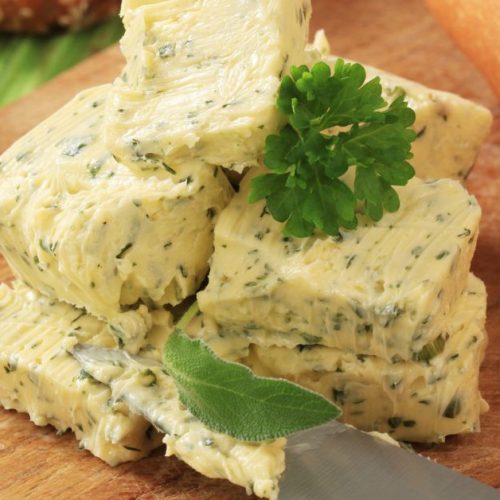
Make Herb Butter with Dried Herbs
Ingredients
- 1/2 cup Unsalted Butter
- 2 tsp Dried Parsley
- 1 tsp Dried Chives
- 1/3 tsp Finely Minced Garlic
- 2 tbsp Lemon Juice
- Kosher salt to taste
Instructions
- Leave the butter at room temperature until it becomes soft. We don't want melted butter, but the one that will be easy to stir.
- Stir butter well. Then add dried herbs, garlic, salt and lemon juice. Again, stir well using a fork.
- You can place the log of butter directly in the fridge covered in parchment or wax paper.
